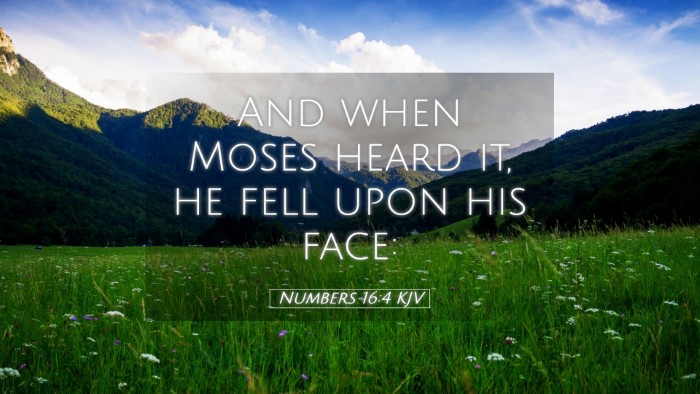Analysis and Commentary on Numbers 16:4
Verse: “And when Moses heard it, he fell upon his face.” (Numbers 16:4, ESV)
Introduction
This verse belongs to a critical chapter in the Book of Numbers, where Moses deals with a rebellion led by Korah against his leadership. The context demands an understanding of not only the events unfolding but also the spiritual implications for the Israelite community as they journeyed in the wilderness.
Moses’ Response
Moses’ reaction, falling on his face, speaks volumes about his character and leadership style. His first instinct is one of humility and desperation before God, rather than retaliating or seeking to assert his authority. This action is indicative of a profound spiritual integrity, as noted by various commentators.
- Matthew Henry: Henry points out that Moses' falling on his face is a sign of prayerfulness, indicating his dependence on God amidst conflict. Rather than responding in anger, Moses seeks divine guidance in a moment of potential chaos.
- Albert Barnes: Barnes elaborates that this act also reflects Moses’ awareness of the serious nature of the rebellion. By falling on his face, he acknowledges the weightiness of the situation, realizing that this is not merely a challenge to his authority but a challenge to God's appointed order.
- Adam Clarke: Clarke highlights that falling on his face is emblematic of intercession. Moses effectively positions himself between the rebels and God’s impending judgment, illustrating the role of a mediator.
Theological Implications
Theological insights from this verse center around the nature of leadership and the heart of true intercession. In the face of dissent, Moses models a crucial leadership trait—humility.
- Humility before God: The act of falling to the ground symbolizes subservience to God’s will. Moses is portrayed not as a dictator, but as a servant-leader who understands the need for God’s intervention.
- Prayer as a Response: The text suggests that in moments of great conflict, prayer is the most powerful response. Moses’ posture indicates the significance of seeking God when human attempts have failed.
Context of Rebellion
The rebellion led by Korah was not merely personal; it questioned the legitimacy of Moses and Aaron's leadership, challenging God’s established order. Understanding this context is crucial for interpreting Moses' actions:
- Cultural Significance: In the ancient Near Eastern context, rebellion against established leaders could have dire consequences. Moses’ humility represents a stark contrast to the arrogance of the rebels.
- God's Authority: The challenge to Moses is, in essence, a challenge to God. This reflection is vital as it places the authority of chosen leaders in the broader perspective of divine sovereignty.
Applications for Church Leadership
This verse can profoundly inform contemporary church leadership and community dynamics:
- Leading with Humility: Today's leaders can take a cue from Moses’ example. In the face of conflict or challenge, a humble approach fosters unity rather than division.
- Emphasis on Prayer: The priority of prayer in the leadership agenda is paramount. Leaders are encouraged not to react swiftly in their flesh but to seek divine wisdom and intervention.
- Embracing Suffering: Like Moses, leaders may face opposition. Their response should reflect reliance on God and a willingness to stand in the gap for their congregations.
Conclusion
Numbers 16:4 is a poignant verse that offers significant insights into the character of Moses and the principles of Godly leadership. In an environment filled with challenges and potential discord, the attitudes of prayerfulness and humility are highlighted as vital components for any leader seeking to remain aligned with God’s will.
As the church continues to navigate its contexts, may leaders be inspired by Moses' response—falling on their faces before God and seeking His guidance in all matters.


